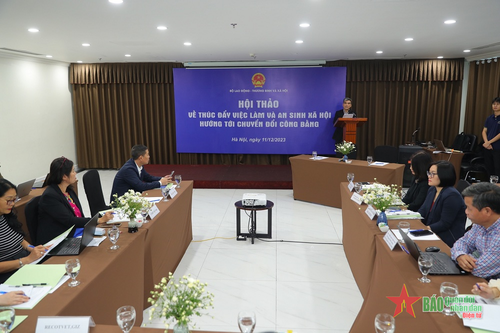 At the workshop called "Promoting Employment and Social Security towards a Just Transition" organized by the Ministry of Labor, Invalids and Social Affairs (photo: qdnd.vn) At the workshop called "Promoting Employment and Social Security towards a Just Transition" organized by the Ministry of Labor, Invalids and Social Affairs (photo: qdnd.vn) |
Vietnam is one of the first three countries (after South Africa and Indonesia) to join the Political Declaration on establishing a Just Energy Transition Partnership (JETP).
At the 28th Conference of the Parties to the United Nations Framework Convention on Climate Change (COP28) in Dubai, UAE, on December 1, partners pledged 15.5 billion USD to support Vietnam's green transition.
Challenges and opportunities facing labor market
At a workshop called "Promoting Employment and Social Security towards a Just Transition" organized by the Ministry of Labor, Invalids and Social Affairs on Monday, experts voiced concern that energy transition and carbon market development may create inequality between sectors and between communities.
Luu Quang Tuan, Director of the Department of International Cooperation of the Ministry of Labor, Invalids and Social Affairs, said: "New opportunities during this transition can have impacts on vulnerable groups, including job displacement, job loss, worker skill shortages, and mismatch between the skills of the existing workforce and the needs of the green economy. The lowest income groups may be particularly affected by energy transition."
This reality requires social security policies and incentives to support job transition, develop sustainable livelihoods, and ensure decent green jobs. These policies need to ensure that workers are retrained and helped to transition to new jobs. The vocational training system must be adjusted to meet new demands and the number of jobs created or lost in each sector should be forecast.
Consistent understanding
It’s certain that some groups of people will not be able to keep up with the energy transition, but recent achievements in poverty reduction and job creation suggest that Vietnam can solve the problem.
Ensuring the rights of vulnerable social groups is always an important part of Party guidelines and State policies and laws.
Professor Dr. Ta Ngoc Tan, Permanent Vice Chairman of the Central Theoretical Council, said: "Social development, human development, and constant improvement of people’s material and emotional well-being are the core goals of Vietnam’s development process. Along with economic development, Vietnam has always focused on social policies with a goal of making sure economic growth goes hand in hand with social progress and justice in order to bring more happiness to the people."
Bui Ton Hien, Director of the Institute of Labor Science and Social Affairs of the Ministry of Labor, Invalids, and Social Affairs, said: "Fine-tuning market institutions is an important factor in job generation. Vietnam creates 1.5 to 1.6 million jobs per year and the unemployment rate is below 3%. Workers' incomes have improved in recent years, narrowing the gap between urban and rural areas. A multi-dimensional approach to sustainable poverty reduction has been implemented and is considered a model in the fight against poverty by the international community."
Vietnam centers its development on people. The government will continue to pay attention to vulnerable groups by reforming its social assistance and social security system and increasing its budget for social security to keep poverty rate low and help people keep up with national development.